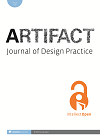-
oa Experiments all the way in programmatic design research
- Source: Artifact, Volume 6, Issue 1-2, Dec 2019, p. 8.1 - 8.20
-
- 01 Dec 2019
Abstract
Experiments take various forms, have various purposes, and generate various knowledge; depending on how, when and why they are integrated in a design research study with a programmatic approach. This is what we will argue for throughout this article using examples and experiences from our now finalized Ph.D. studies. Reviewing the prevailing literature on research through design the overall argument is that design experiments play a core role both in conducting the research, in theory construction and in knowledge generation across the different design domains and methodological directions. However, we did not identify sources that explicitly discuss and operationalize roles and characteristics of design experiments in different stages of programmatic design research. The aim of this article is therefore to outline a (tentative) systematic account of roles and characteristics of design experiments. Building upon Schön’s definition of experiments in practice we propose adding to the prevailing understanding of experiments in research through design understanding and operationalizing design experiments (1) as initiators or drivers framing a research programme, (2) as ways to reflect on and mature the research programme serving as vehicles for theory construction and knowledge generation and finally (3) as a ‘designerly’ approach to the written knowledge dissemination and clarification of research contributions.


